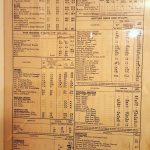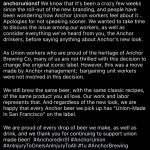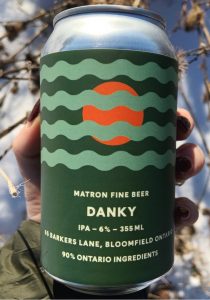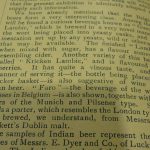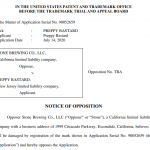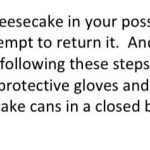 What a difference a week makes. My birthday is coming up. My 18th bloggaversary is coming up. My jab appointment is coming up. The radishes are well up. Speaking of the 18th bloggaversary, I was thrilled to realize that quite early on I had witnessed and captured forever perhaps the first bit of beer blogging snark or at least shade back in 2003. Nothing like being a part of history. Oddly, someone just offered me $300 for that original URL “genx40.com” under which the beer blogging started. I can’t imagine what for.
What a difference a week makes. My birthday is coming up. My 18th bloggaversary is coming up. My jab appointment is coming up. The radishes are well up. Speaking of the 18th bloggaversary, I was thrilled to realize that quite early on I had witnessed and captured forever perhaps the first bit of beer blogging snark or at least shade back in 2003. Nothing like being a part of history. Oddly, someone just offered me $300 for that original URL “genx40.com” under which the beer blogging started. I can’t imagine what for.
Pubs are open in England for outdoor service and apparently everyone I follow is a vitamin D deficient dipsomaniac. Except Matt. He was anxious. And Boak and Bailey hovered. Me, even after I get the jab it’s going to be a while before I am settled enough to race towards a crowd. Retired Martin, as always, provided a great photo essay of his experience, a portion of one of which is captured above. I love capturing of the moment, the hipster hat in shades next to the guy at the left taking a seat. Two years from now the set up will look like something from a sci-fi movie.
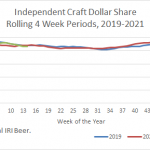 Speaking of things not affected by the pandemic, what is not to love about this chart provided by BA Bart indicating what is needed to be remembered if you hang your emotional well being on the peg of craft beer. It shows the percentage of actual craft (not baloney craft) sales as a percentage for the years 2019, 2020 and into 2021. The percentage is stable. You see it dips in the summer when normal people buy more normal beer. And rises when they slow down. Nice. Pundits can cease their concerns otherwise.
Speaking of things not affected by the pandemic, what is not to love about this chart provided by BA Bart indicating what is needed to be remembered if you hang your emotional well being on the peg of craft beer. It shows the percentage of actual craft (not baloney craft) sales as a percentage for the years 2019, 2020 and into 2021. The percentage is stable. You see it dips in the summer when normal people buy more normal beer. And rises when they slow down. Nice. Pundits can cease their concerns otherwise.
In the greatest city in the world, Montreal, people are falling in love with the local lager scene:
Richer says lagers “appeal to a lot of different people” — everyone from “Monsieur et madame Tout-le-monde,” who might normally be fans of Molson or Labatt, to beer geeks who are looking for something simple, but well-crafted, and with lots of variety. To be clear, this isn’t a trend created by the pandemic — just accelerated by it. Across Quebec, hopheads still rush out to the latest can releases at breweries like Messorem Bracitorium, Brasserie du Bas-Canada, and Sir John, which specialize in full-on, double-dry-hopped hazy IPAs. But even those breweries are making lagers.
Perry. One of my heroes in the drinks writing world is Jancis Robinson and this week she offered her website a space to let us know about a rare perry:
Flakey Bark is a marvel of a drink. Broad, bold, structural, it carries on its breath a muscular depth of pear skin, peach pit, earthy bacon rind and wet slate. Its tannins in youth are formidable – so much so that eating the fruit raw is said to skin the roof of your mouth. It is built for food-pairing, offers extraordinary versatility in that respect, and with age it unfurls into layers of riper, fleshier fruit. A treasure – a delicious one. And one bad storm could wipe it entirely from existence, because there are only six mature Flakey Bark trees left in the world.
Nutso. Absolutely nuts. Speaking of which: brewery gets grocery store deal, brewery told off apparently by morons.
I set out a slightly different understanding of the agreement which binds Ontario’s In and Out Store, aka The Beer Store, compared to some skuttlebutt observations being made. Our own expert beer business reporter Josh Rubin knows more about the situation than anyone else and has set out the deets in The Toronto Star. Very unlikely (aka impossible) that the team leading the big brewers who own TBS into the 2015 Master Framework Agreement that gave us grocery store beer did not see the writing on the wall for the system’s long term prospects. The ten year deal gave them the time to transition.
Or maybe an agreement to terminate. The talks leading to 2015 weren’t exactly public but getting ten years to transition otherwise stranded capital assets into operational loss offsets is a pretty civilized way to wind up EP Taylor’s brilliant idea as it became obsolete… it ends up being free to the 3 owner/breweries’ own pockets and fairly organized as it gives them time to sell the properties applying the funds meaningfully. Not unlike how the Federal gov’t has done it since Chretien. Securing the pension plan will be the big question.
That last point is key. The question of the land and buildings in the inventory of assets is not an issue. Otherwise useless assets offset operational losses. That’s part of the solution. That’s having a spot to put down the hot pan from the oven. The pension, however, is potentially problematic unless it is vested and capitalized. If so, all in all it was a brilliant plan.
Looks like Flying Dog,* the sort of brewery folk thought much about before the second Obama administration, has lifted the IP from BeerKulture, the diversity collabs they were working with:
Hi, @FlyingDog! Did you folks really have a meeting with @beerkulture to work on a collab, walk away from it, and then release Kulture King? That’s disgraceful, dilutes @beerkulture’s brand, and undermines the work they do to make beer better.
Two odd last things. Folks for over a decade have suggested that there is an issue with the reality of the Great White Male narrative in craft beer. Good reason. It’s a false construct. This is not news. Why did you think it was? Also, the idea that WBB invented criticism of craft beer? Maybe if you were nine years old in 2014. Please. A very fine voice but pretty much common until folk stopped caring much about craft beer in 2015. Grow up. Buy my book. Please.
I really still can’t tell you anything about Project X but it is exciting and charming and… interesting. More laters. Meantime, check out the weekly updates from Boak and Bailey mostly every Saturday, plus more with the weekly Beer Ladies Podcast, at the weekly OCBG Podcast on Tuesday (who marked their 100th episode with gratitude for all) and sometimes on a Friday posts at The Fizz as well. There is more from the DaftAboutCraft podcast, too. And the Beervana podcast. And sign up for Katie’s weekly newsletter, The Gulp, too. Plus the venerable Full Pint podcast. And Fermentation Radio with Emma Inch. There’s the AfroBeerChick podcast as well! And also look at Brewsround and Cabin Fever. And Ben has his own podcast, Beer and Badword – when he isn’t in hiatus as at the mo, more like timeout for rudeness. And remember BeerEdge, too. Plus a newcomer located by B+B: The Moon Under Water.
*A proud sponsor of many of A Good Beer Blog’s Christmas Photo Contests of 2005 to 2016… or so…



